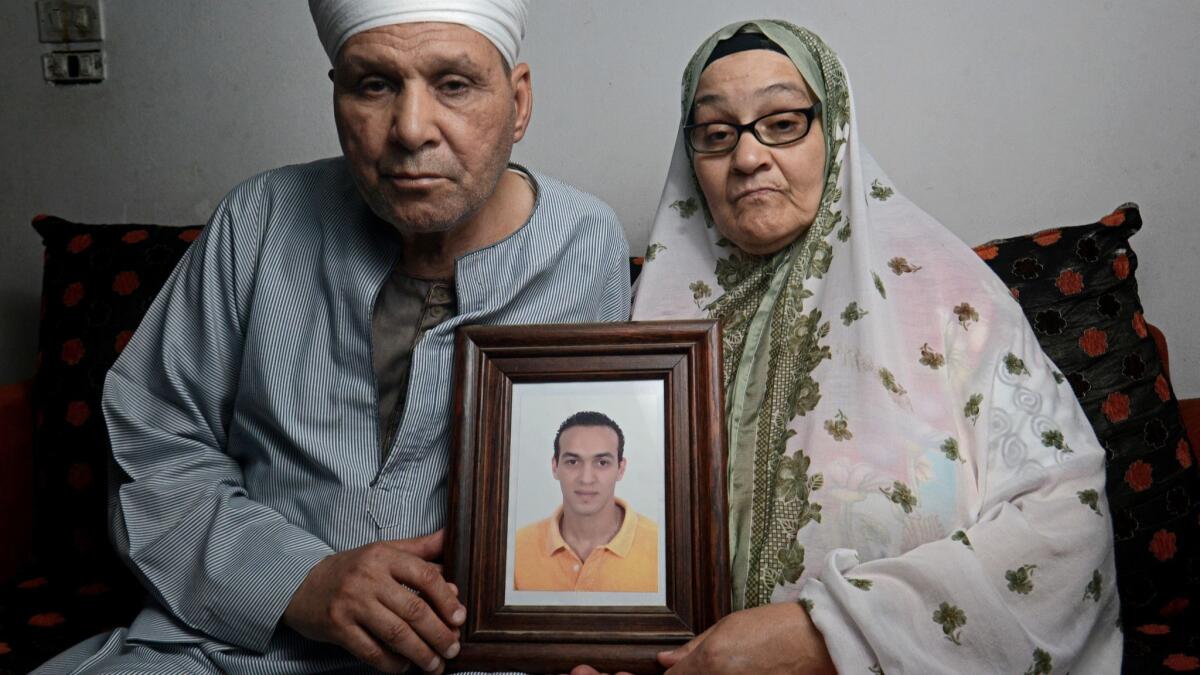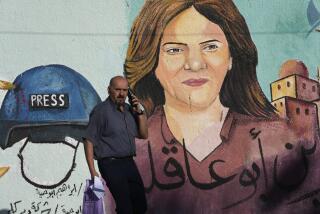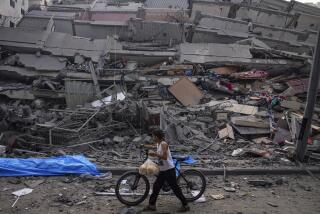An Egyptian photojournalist was ordered released from prison months ago. Why is he still behind bars?

- Share via
Reporting from Cairo — An Egyptian photojournalist jailed since his arrest while he was covering a deadly 2013 raid on protesters is still languishing in prison, even though a judge ordered his release in September.
Mahmoud Abou Zeid’s release — and that of 214 others — has been delayed by six months because the prisoners must first pay for damages and judicial fees, but authorities in Cairo have not determined the amount, said Karim Abdelrady, the 31-year-old photographer’s lawyer.
For the record:
11:00 p.m. Nov. 26, 2018An earlier version of this report referred to the organization Reporters Without Borders as Reporters With Borders. This story also states the cost of damages from a security forces raid would have been charged to 215 prisoners. The damages would have been spread among all defendants in the case.
“This is illegal,” Abdelrady said, “because the law says if someone is imprisoned for not paying the fine, they have to first be notified of what the fine is.”
Abou Zeid, known by the nickname Shawkan, was arrested Aug. 14, 2013, after security forces raided the camp of protesters supporting Mohamed Morsi, the country’s first democratically elected president, who had been overthrown by the army six weeks earlier.
Human Rights Watch estimates that more than 800 people were killed when security forces broke up the camp in Rabaa al-Adawiya Square.
Abou Zeid has maintained that he was arrested simply for doing his job; he had been covering the dispersal for a now-defunct British photo agency.
He is one of at least 38 professional and nonprofessional journalists imprisoned in Egypt for their reporting, according to Reporters Without Borders, which ranks the country 161st out of 180 on its 2018 World Press Freedom Index.
The photojournalist’s plight has drawn global sympathy, with Amnesty International calling him a “prisoner of conscience.”
Abou Zeid was sentenced this year in a mass trial with more than 700 others, mostly supporters of the now-banned Muslim Brotherhood group. The judge on Sept. 8 gave him a sentence of five years, which by then he had already served.
The judgment mentioned that defendants would need to pay the charges, but “the verdict didn’t mention an amount,” Abdelrady said.
Under Egyptian law, those who can’t cover the charges remain imprisoned.
Authorities “don’t know how to move forward with this, so in order to avoid making mistakes and collecting the incorrect amount, they decided to keep them for the longest period possible, which is six months,” Abdelrady said.
The prisoners’ release is now expected in mid-February.
Abou Zeid’s family had expected to find out the amounts of the fines soon after the verdict; they asked the prosecutor’s office every day but never got an answer, said Abou Zeid’s older brother, Mohamed.
The Times was unable to reach a spokesperson for the public prosecutor’s office for comment. The Interior Ministry referred requests for comment to the State Information Service, which has yet to respond.
The situation is upsetting for Abou Zeid’s family, especially his parents, his brother said.
“We got his room and clothes ready for his arrival, and some of his friends planned to come and stay over with him” in his apartment in Giza, Mohamed Abou Zeid said. “Everyone is very disappointed.”
Mohamed acknowledged that he and his family would probably have been able to pay only the judicial fees, not the charge for damages. The total for damages, related to public and private property and the vehicles of the security forces during the camp raid, was expected to be in the hundreds of thousands of dollars among prisoners.
The situation Abou Zeid and the other prisoners face is outrageous, said Hossam Bahgat, a noted human rights activist and journalist in Egypt.
“What is most insulting about this is not just the fact that massacre survivors have been imprisoned for five years and now are asked to pay for the damages,” he said. “But the state decided to lock them up for the maximum period under law for six months without bothering to make a public announcement that this is why they are being held.”
Islam is a special correspondent.
More to Read
Sign up for Essential California
The most important California stories and recommendations in your inbox every morning.
You may occasionally receive promotional content from the Los Angeles Times.












